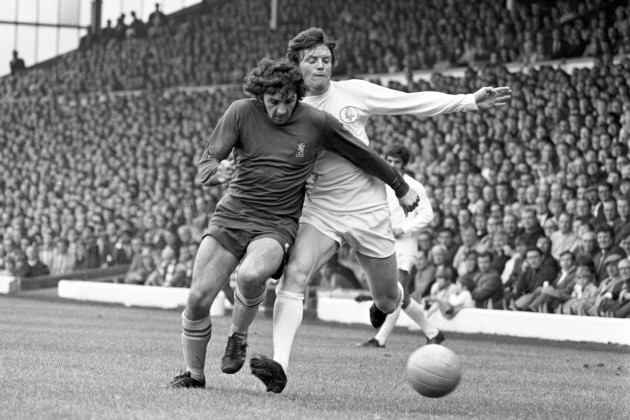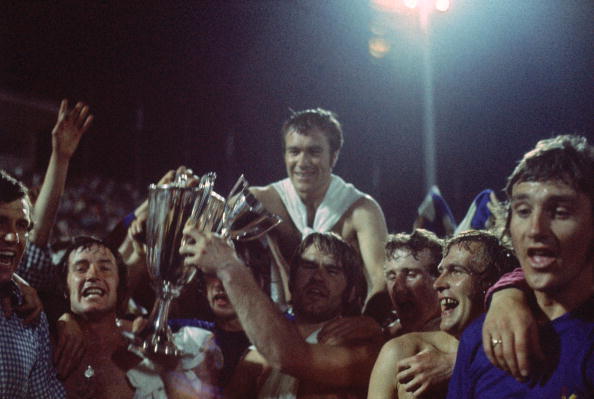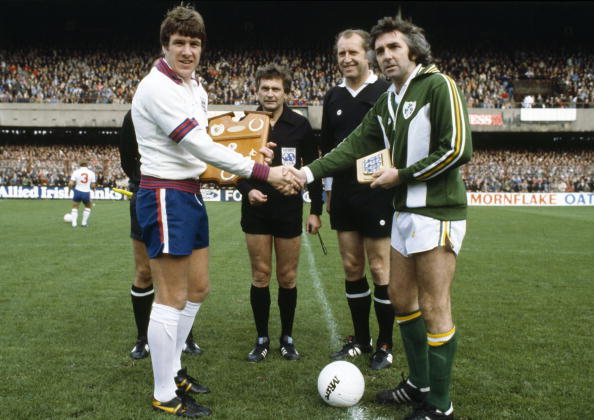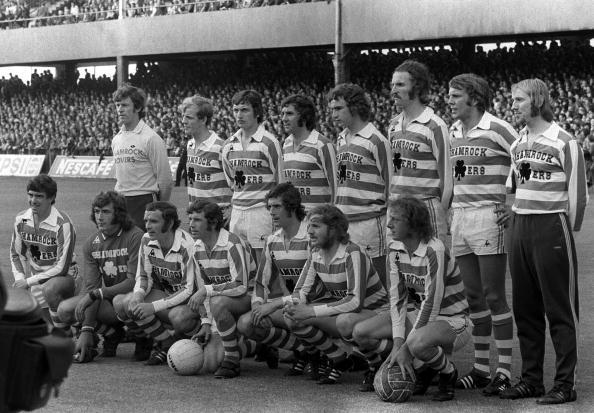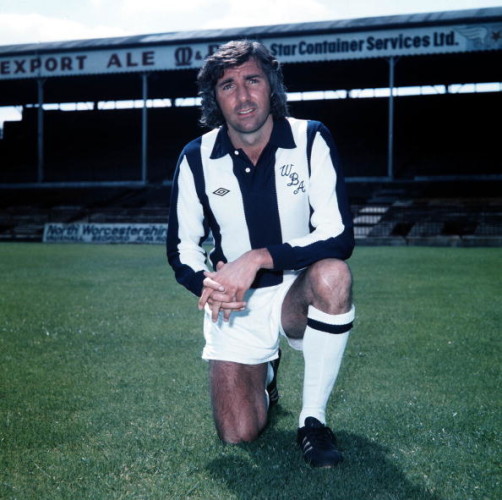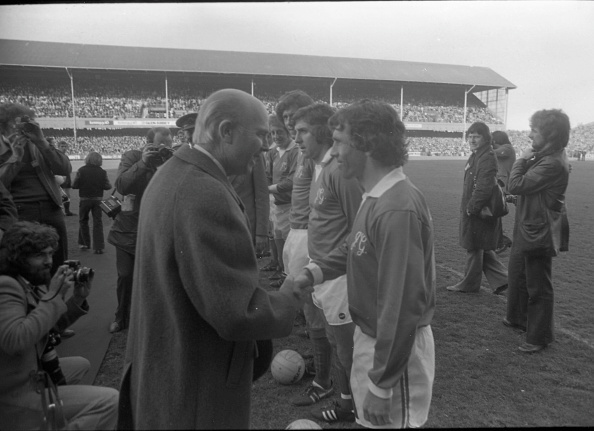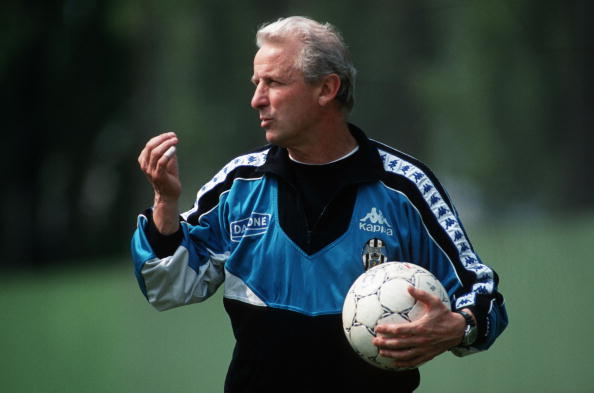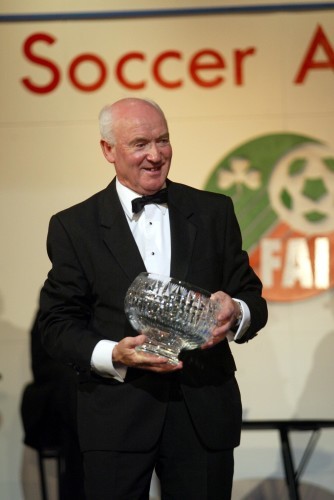PADDY MULLIGAN FEELS it could easily have been so different.
Now 73, the ex-Ireland defender looks back on his distinguished career in football with immense pride.
And rightly so.
On top of representing his country 50 times and contributing to some unforgettable moments in the green shirt, he played for two decades in the League of Ireland, the US and England.
In terms of silverware, Mulligan won seven trophies at Shamrock Rovers, including four FAI Cups, and the 1971 Uefa Cup Winners’ Cup with Chelsea — seeing off Real Madrid in the final after a replay was needed.
There were also a brief stint as assistant manager of Panathinaikos, during which the Greek club defeated Giovanni Trapattoni’s Juventus 4-2 in the Uefa Cup only to exit the competition 6-4 on aggregate.
However, according to the man himself, he would not have been able to maximise his potential but for a brave decision to turn his back on Bohemians as a teenager.
Paddy’s childhood in the early 1950s was spent kicking a ball around Chapelizod “day and night”, while he would often go to watch St Patrick’s Athletic in the nearby greyhound stadium. Uncle Dick sometimes brought him out see Shamrock Rovers in Milltown too.
With relatives in Galway, the summer-time meant trips to Tuam and although it was “very GAA-orientated”, they still managed to get the occasional game of soccer in.
His first experience of semi-organised sport was taking part in Dublin street leagues as a boy, after his family had moved to Beaumont on the northside of the city.
You could be playing against somebody 40 years of age!” he recalls. “That was a good grounding because you learned how to win a tackle and make sure that you took care of yourself.”
Mulligan may not have believed he was good enough for Home Farm, but they disagreed and a trial was organised for him and Pat Heffernan — a friend from Whitehall — in 1958.
“I said they’d have to ask my mam and dad first but they had already checked,” he says. “So we played in a game and won 6-2. I scored four and made two for my pal, Pat. Joe Fitzpatrick was the manager of the U14s and he explained that he wanted to sign me. So I was thrilled.”
Having started off as a midfielder, his Home Farm boss took the decision to move him back to right full-back at the age of 16. And the switch would pay dividends.
Bohs, who were managed by George Lax, soon got wind of this young defender and spent a year enticing him to join. Paddy’s father eventually agreed, but only on the condition that he could leave after a month if it didn’t feel right.
As it turned out, his first experience of a League of Ireland club did not prove to be a positive one.
“I didn’t enjoy my spell at Bohs at all,” Mulligan states. “As far as I was concerned, Home Farm were far more professional than Bohs. If you didn’t train with Home Farm, you didn’t play on Sunday. But Bohs players could come and go as they pleased.
Even at 16/17 years of age, I felt ‘This is wrong… this can’t be right’. I was brought up with good habits but there was a bad attitude there. They were an amateur club and they played and behaved like amateurs. Having come from Home Farm, we did everything as correctly as we possibly could. I got annoyed about that.
“After a month, I felt I had enough and I couldn’t handle any more of it. You’re supposed to enjoy your football, but I wasn’t. I was 17 years of age, but it felt like a burden so I knew it was time to go.”
On leaving the Gypsies and the effect it may have had on his career trajectory, he adds: “It’s only my opinion and I could be wrong, but I don’t believe I would have fulfilled my potential if I’d stayed at Bohs — mainly because you weren’t playing with the same quality of player. With all due respect to Bohemians at that time, the players at Shamrock Rovers were far superior.”
Home Farm were glad to take him back, and Mulligan played for their Leinster Senior League team in the summer of ‘63. Later that year, however, Bohs’ Dublin rivals Rovers made contact.
“It came out of the blue completely,” he admits. “Rovers got in touch and I discussed it with my mother and father, who felt it would be a good idea.
“That was a few months after the Bohs situation, and I thought I had played enough for Home Farm. If I wanted to further my career, I would have to move to a League of Ireland club. Like every footballer, I had an ambition to go to England so I was hoping I could fulfill that.”
Whereas he felt let down by the attitude of the Bohs squad, Mulligan now found himself rubbing shoulders with some LOI greats.
“Rovers were a smashing team,” he says. “They had wonderful players and wonderful people at the club. When I walked into the dressing room, there were the likes of Ronnie Nolan, Liam Tuohy, Johnny Fulham, Paddy Ambrose, Frank O’Neill and John Keogh… magnificent.”
Although impressed by his new surroundings and having made his competitive debut in a 7-1 win over his former club, it wasn’t all rosy at the beginning as he and manager Sean Thomas disagreed on his best position.
“I’ve a funny story,” he begins. “Sean brought me up to Rovers to replace Jackie Mooney. He was an inside forward, who would score lots of goals. I didn’t scored many goals, so I couldn’t believe it.
“There was only one Jackie Mooney, a wonderful player and a fabulous fella as well. I couldn’t fill Jackie’s boots but Sean had this idea in his head. If the wrong instruction is given to a young player, how quickly it could ruin their career.
You have to be strong enough to stand up for yourself. So I said ‘Look it, I’m not an inside forward’. I’m a defender and that’s it’.”
As fate would have it, Thomas departed the Hoops to take over at Bohemians and Liam Tuohy was handed the job in 1964. Rovers started that season with a friendly against Manchester United at Dalymount, and although they lost 4-2, Mulligan played exceptionally well.
When Pat Courtney picked up an injury, he got his wish to move to full-back — albeit on the left side — for a game in Waterford.
“It was as if I had played there all my life. I had played right-back, left-back and centre-half at Home Farm, so it wasn’t anything new to me. From there, Rovers was great.
“Only on the odd occasion did I play inside forward when they were really desperate. Otherwise, I was a defender and I enjoyed my football immensely.
“They were great people and it was a pleasure to be at the club. The camaraderie with the lads was brilliant. It was a fabulous time and you couldn’t have asked for any more.”
Rovers were FAI Cup specialists in those days and Mulligan went on to lift the trophy four times — in 1965, 1966, 1967 and 1969.
In ’67, Rovers were one several clubs from around the world to take part in the one-off season in the United Soccer Association as Boston Rovers. Unfortunately, Mulligan picked up a bad knee injury four weeks into the trip and required surgery. After returning to fitness, he agreed to join the newly-formed Boston Beacons in the North American Soccer League (NASL), and although they folded midway through their first season, he still looks back on the Stateside experiences with fondness.
Still dreaming of a move to England, the defender learned of interest from Everton in 1969. He agreed to travel to Liverpool to speak to Toffees manager Harry Catterick one Friday morning, but the journey didn’t turn out to be a fruitful one.
“Harry Cooke, the key scout, met me at the airport and brought me down to the training ground,” Mulligan remembers vividly. “I spoke to a group of the players, who were smashing lads and they wished me all the best. They said ‘Get a good deal for yourself, and hopefully we’ll be seeing you’.
“But Harry Catterick left me sitting outside his office for 45 minutes. Harry Cooke told me he’s busy, and I replied ‘He’s supposed to be busy with me, Mr Cooke’. I had gone over to negotiate a deal with the view to signing for Everton Football Club, and it didn’t look like Mr Catterick was that interested.”
When the meeting finally took place, Everton’s offer was “derisory” and Mulligan said he couldn’t sign for that money.
I told him I wasn’t happy with the deal but he was probably thinking that I was Irish and just off the plane so I would be desperate to get to Everton. I was lucky, as I was 24 at that stage and some part of my head was screwed on.
“So I got back to Dublin Airport at lunch hour that day and a journalist from the Irish Independent, Noel Dunne, was waiting for me. He said ‘Congratulations, I see you’ve signed for Everton’. I told him I hadn’t and when he said it was in the paper, I replied ‘Noel, you work in the paper and do you believe everything you read in there?’.
“He thought I was only messing with him but I said I wouldn’t be at Everton’s game the following day as I would be playing for Rovers in Athlone.”
Harry Cooke then called that night to make arrangements to come to Ireland, but when he arrived over, the deal was exactly the same as before.
“I told him he was wasting his time,” adds Mulligan. “He thought I had been tapped up by another club, but I said nobody else was in for me at that stage, to my knowledge. Shamrock Rovers may have known something else, but certainly in those days, you would be the last to find out.
“I reiterated that I wouldn’t be signing unless it was the offer I wanted. I wished him good luck and said to have a safe trip back.”
10 days passed before Chelsea registered their interest and Mulligan found himself on another flight — this time to Heathrow.
“I was getting off the plane and there were a whole load of photographers down at the end of the steps,” he says. “I was thinking that I hadn’t seen any famous actors or singers, so I just kept walking down. They shouted ‘There he is’, and I looked behind me, but it was me they were coming to photograph.
I thought to myself ‘Welcome to London’.”
Upon meeting Chelsea assistant manager Ron Stewart, he immediately made his mind up as “Ron looked like an honest and honourable man”. Manager Dave Sexton was waiting at Stamford Bridge for the pair, and a satisfactory contract was ironed out in all of 20 minutes. There was last-minute interest from Charlton Athletic, but Mulligan was certain of his preferred destination.
He admits relocating to London initially took some getting used to.
“It was a bit of a culture shock, but at least you’re not on your own because you’re going into a club and the people at Chelsea were great. The staff were very friendly, the players were great and it was smashing. There was no problem at all.
“In those days, there was nothing happening in England on Sundays, whereas at home you would have the soccer matches and the GAA and the whole lot. It was a day of sport here. I would be trying to get your radio at the right angle to pick it up in the apartment, but you would be all over the place looking for the latest scores!
“Chelsea were very good to me. We should have won more and we had the squad to but it didn’t materialise. It was still a great time with players like Charlie Cooke, Ian Hutchinson and David Webb. Alan Hudson should have achieved a lot but he didn’t look after himself.”
The Pensioners did get their hands on European silverware in 1971. Having beaten the likes of CSKA Sofia, Club Brugge and Manchester City along the way, they met Real Madrid in the final at the Karaiskakis Stadium in Piraeus, Greece.
Peter Osgood put them 1-0 up but Iganacio Zoco equalised in the 90th minute, with Mulligan coming on as a late substitute. Three days later, Osgood struck again along with former Ireland international John Dempsey in a 2-1 victory for the First Division side.
“The modern player wouldn’t be too happy,” says Mulligan. “We played them on the Wednesday and then we met in the replay on the Friday. It was only a European Cup Winners’ Cup final, that’s all… sure why wouldn’t we play 48 hours later?
“To go and beat Real Madrid in a final was absolute bliss — heaven. It was a great performance by the team.”
The following season, they reached the final of the League Cup. As a schoolboy, Mulligan’s Home Farm manager Joe Fitzpatrick had predicted that he would one day line out at Wembley, and now he was being named in Chelsea’s starting line-up to face Stoke City at the famous stadium.
But the occasion was to be cut short for the defender, as terrible challenge from Mike Pejic forced him off the pitch on the half-hour mark before the Potters went on to claim a 2-1 win.
“I got done on the ankle by a horrible tackle and Dave [Sexton] wanted me to go out and play,” Mulligan reveals. “But they had to put me in plaster cast so that was my day finished. We had been the out-right favourites and maybe some of the lads thought it was going to be easy but it never was against Stoke. They were a good side, [Ireland's] Terry Conroy was playing that day and they also had Peter Dobing.
These things happen and that’s what the game is all about. You get these tackles and you hope that it’s not too bad. It’s just a pity that it was in a final at Wembley.”
At international level, Mulligan became a mainstay in the Ireland team for 10 years from 1969 onward. It was a tremendous time in his life, despite the fact that they had more than their fair share of disappointments.
“You think that you’ll be happy if you get one cap for your country, but you get greedy in a nice sense because you enjoy the experience so much — even though we got beaten by Czechoslovakia at Dalymount on my debut,” he explains.
“Fortunately, I got far more than I thought I would get. I played against some wonderful teams and many magnificent players.
“The French side had a magnificent team with the likes of Michel Platini and Didier Six. We had our own players such as Liam Brady and John Giles, with Don Givens up front. Mick Martin and Gerry Daly were two very underrated players.
“I look at midfielders today and none of them can do with those two can do. They could get on the ball, they could play, they could attack and defend. They could head a ball too.
“Now we hear that he’s a number six or an eight or a 10. What’s happening? Get out and play. Don’t be afraid of receiving the ball and getting on it. I don’t know which way this crazy game has gone.
“Anyway, we were very unlucky not to qualify for the World Cup in ‘78. We got done in Paris in ‘76 when we were beaten 2-0 by the French. We were 0-0 at half-time and I remember being confident without being overly confident.
“At the very worst, we thought we would get a draw out of the game as they had done nothing. They go one ahead, we come back down and equalise but it’s ruled that Gerry Daly is offside. He was 60 yards away from play so he couldn’t interfere with it.
“I still remember it, he was standing on the right touchline and Brady has gone to the end line and pulled the ball back for Frank Stapleton to head into the net.
“They got away with it because Ireland are not a superpower in world football. The thinking was ‘Ah, it’s only the Irish’. I was sure we have qualified for the World Cup in Argentina. The French went forward as the most attractive team in the tournament, and we had beat them at Lansdowne Road. Brady got a goal that night.
“For that group of players, that was our best performance. I was speaking to the late, great Liam Tuohy and his wife Sheila in the Green Isle Hotel after the game and he said ‘What did you think?
I told him’ That was the best we could have possibly played and we’ll never be able to replicate that’.
“The problem for us at that time was that if we lost one player, we were in trouble because we didn’t have a squad. We just had 11 or 12 and you’re hoping that none of your important players get injured. Of course, they do and it makes life a lot more difficult. But we had a great time at international level.”
Mulligan, who went on to captain the Boys in Green, singles out a 3-0 victory over the USSR at Dalymount in ’74 as his standout memory in an Ireland shirt.
“The Russians were a world-class side. I’ll always remember we went out for a warm-up at 2pm and I was talking to the late Ray Treacy. I felt there was something special going to happen because there were at least 30,000 people in the ground already. That doesn’t happen at Irish soccer games. You don’t the crowd in that early and you normally have them coming in even after kick-off.
“We played exceptionally well that day in Liam Brady’s first international match. He took to it like a duck to water, he was excellent. The whole team as a unit all clicked that day. We had many memorable days. We had a few disappointing ones as well, but that’s the way it goes.”
By 1972, he left Chelsea and agreed to sign for Crystal Palace. That December, he bagged his first two goals for the club in a 5-0 win over Manchester United and the defeat brought Frank O’Farrell’s term in charge of the Red Devils to an end.
However, his time there overall was a nightmare as the Eagles suffered two relegations on the trot.
“It was a bit of a disaster because the team and the club as a whole weren’t ready. You never want to be relegated as a club or on a personal level.
It was a horrible time. We went from one crisis to the next. Bert Head left as manager with only six or seven games left and Malcolm Allison came in, but he didn’t get us out of it. The quality of player just wasn’t there.
“I was club captain and he came to me one day and said ‘What do you think?’. I said ‘Malcolm, you’ve got to look who you might bring in to get us out of this mess’.
“I wouldn’t mind, but just before Christmas of ‘72, we beat Man United 5-0. I got two that day and we should have kicked on from there. We didn’t though, we got beaten the following week away to Leicester.”
Mulligan knew John Giles well from the Ireland set-up, while the pair had also featured for an All-Ireland Shamrock Rovers XI against Brazil along with the likes of Martin O’Neill and Pat Jennings at Lansdowne Road in 1973.
Now Giles was player-manager of West Brom and he offered his fellow Dubliner an exit route from Palace.
“John got in touch and asked if I’d be interested in joining him,” Mulligan tells. “I said ‘Of course I would’. I wanted out of Palace sooner rather than later.
“I drove straight up the M1 to Birmingham and signed for West Brom. We were second from bottom when I joined and I remember saying to the club’s marketing manager that he shouldn’t be surprised if we got promoted that year.
Although John had just come in as manager, I knew he would get the attitude right and get us playing football. We did go up and at the end of the season.
“John was on a high at that time and he was at his absolute best from a management point of view. He was playing brilliantly as well. There was great camaraderie at West Brom and it was just like the Irish set-up. We would have died for each other, and once you’ve got that along with a bit of skill you’ve a chance of doing something.
“There was great dedication and there were no messers in the club or anyone going out to act the big boy. We played some good football as well.”
Like many, he rates Giles as the greatest player to ever pull on the green shirt.
“John would have been the best I played with,” he adds. “I was too young to play with Paddy Coad, but I saw many times with the great Shamrock Rovers team of the ‘50s and he was a magnificent player.
“He never went away to England, because he didn’t want to go . Two-footed player, a great football brain. The very, very best.
“In my eyes, he would run John very close as the best Irish player ever. There’s no talk about him though. I think some people believe there was no football in this country back in the ‘30s and ‘40s, but there was.
“We had lots of good players long before you or I came along. To give you an example, Ireland played West Germany in 1956 on a Sunday afternoon at Dalymount. They were the world champions, but Ireland beat them 3-0 with seven League of Ireland players in their team. In May of that year, Ireland went to Rotterdam on a Saturday and defeated Holland 4-1 in a friendly international.
Ireland have always had fabulous players, just maybe not enough that have come in a stream together. Anyone who thinks we haven’t should check your history, folks.
“We have had wonderful players, and the League of Ireland was very strong in the ‘50s and ‘60s. I was fortunate enough to play when we were getting 30-40,000 people at games.”
With his playing days coming to an end, Mulligan returned to Rovers for a second spell in 1979. However, an opportunity to do some coaching in Greece then arrived out of the blue.
Ronnie Allen, who had replaced Giles as West Brom manager, took over at Panathinaikos and offered Mulligan the chance to work under him. That season, they came up against the mighty Juventus in the Uefa Cup.
Managed by Giovanni Trapattoni and with Liam Brady in their side, the Old Lady claimed a 4-0 first leg victory in Turin. Allen was sacked that night and Mulligan ended up being put in temporary charge along with one of the other coaches.
In the return leg, Panathinaikos got the better of Juve with the help of an intimidating atmosphere but exited the tournament 6-4 on aggregate.
Brady ran across to me and said ‘Paddy, your players are fucking mad. Calm them down, will you!’” he recalls.
“The crowd were mad too and it looked like we were on for a great comeback. It was a super experience to see how the players responded after a 4-0 drubbing. The atmosphere was incredible as well.”
After two years in Athens, it was back to Ireland and he tried his hand managing Galway United and Shelbourne. That was short-lived, however.
“There were so many problems and money issues with players not getting paid on time and the likes,” he replies, when asked why a career in management didn’t last longer. “It was just a mess and the players then think that you’re holding out on them. It was a shambles and I decided it wasn’t for me.
“I remember when I packed it in with Shels in 1986, I made a promise that I would never get involved with management in the League of Ireland again. I loved the football but I didn’t need the grief.”
That said, Mulligan had very nearly become Ireland manager in 1980. Losing out to Eoin Hand by two votes, the story goes that one FAI official opted against Mulligan because he had once accidentally hit him with a bun on an away trip.
“Eoin beat me 9-7. When I heard, I wished him all the best as we’ve always been pals. The man who should have got it was Liam Tuohy though. With all due respect to Eoin, if I didn’t get it I was hoping that Liam would. He was a fountain of information, a magnificent man. He knows the game and people so well. You’d go through a brick wall for Liam. Whatever he asked, you would do it because you knew he was asking you for the right reasons.”
Mulligan, who was inducted into the FAI Hall of Fame in 2008, now spends his days doing some media work with TV3, while he and ex-Bohemians and Ireland striker Turlough O’Connor often wander up to Dalymount Park on a Friday night.
I love going there, it’s the real home of Irish soccer for me,” he ends.
“I go to Tallaght to see Rovers sometimes too. With the TV work, I still watch all the Premier League matches and so on. Once you’ve been involved with the game, you stay involved no matter what… even if you don’t agree with some of the things that go on nowadays.”
The42 is on Instagram! Tap the button below on your phone to follow us!

